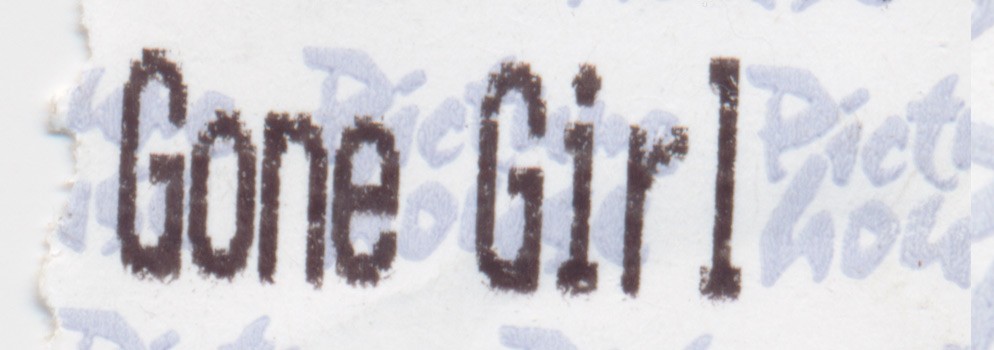Gone Girl

Who speaks for Doogie Howser?
Gone Girl is a moderately entertaining TV movie, with, like Cabin in the Woods, an ending that spoils the whole affair. Funny that its director made a dull remake of TV movie himself recently, and funnier still that its star made a toweringly superior film on a related subject, Gone Baby Gone.
Fine. A related title.

But we come here to spoil Fincher, not to praise him, so let’s get to all that mediocrity that will in no way live after him. I would feel bad about spoiling the film, but 1) you’ve already seen it, 2) I don’t, and 3) pretty much every critic already did. This is odd to me because they are paid not to spoil things. I, on the other hand, am not paid to spoil them. To complete their job without the schadenfreude hypocrisy:
1) She’s not dead, and
2) is framing him for his murder,
3) winds up killing Doogie and,
4) gets away with it because she’s going to have a baby.
The end.
You make think that you’re being clever by comparing Gone Girl to Fatal Attraction, but in so doing you’ve just given away the major point that 1) she’s still alive and 2) she’s like evil and stuff. Oh, and, by the way critics that don’t see everything, the correct movie to which to liken GG is Presumed Innocent, not Fatal Attraction. I don’t know which is worse, that you suck, or that you’re so incompetent at it. And while I’m aware that this is me comparing a double negative to a single one, this just means I’m competent, only that I’m just not very good at it. In any case, that’s an inverse Annie Hall dig.
Sorry, that’s another film made before 1999. I’m sure you would’ve seen it, but all those Breaking Bad episodes mysteriously keep rising to the top of the queue. Spoiler alert for Breaking Bad: it sucks. Stop watching it.
Speaking of which, let’s spoil 1) first. The fake death has been done to something or other, and despite my general good feelings towards Rizzoli et al., it’s enough of a cliché that pretty much anyone who’s seen Breaking Bad has worked this out as one of the possibilities. What makes this arguably better (though soon to be worse) than Presumed Innocent, is that despite its lack of a cool haircut for the protagonist, Ms. Rosamund Pike’s foul doing is revealed halfway through. This works, despite its being in the hopper of our own various scenarios because of a neat fake out using the diary as if it’s been read from that whole Lovely Bones perspective. The reveal is swell, and makes what had been unfolding before us seem more than mere SVU: Law et al. material. Even though it really wasn’t.

Depressing in a way that someone that actually cares about how a film looks would have his work shown on Screen 2 at the Komedia, which looks as good as a videophone in a 1980s film that takes place in the future. As you have no taste, Mr. Fincher, please consider that randomly as your next project.
Suddenly we have what is so rare in films: tension. Not over the vague suspicion of who will be revealed to be behind it all, but over what might happen next. Looking back, I think it works because of its ingenuity. Having very nicely faked out Mr. Affleck, there’s a feeling that anything could happen. There’s furthermore that unnamed feeling of admiration that gave Hannibal Lecter all his mojo: the film engenders a surprising amount of cred as we sit back and commend Ms. Pike’s scheme, her ingenuity, will and ruthlessness in carrying it out, and even her that-could-be-me vengeful motives.
This goodwill drains away, but drop by drop. This is why, I suspect, the film works for so many critics and not for me, the hole in the container was bigger. There’s no way out of that metaphor, so I’m pressing on. After its reveal, The Plan looms large in our mind, and prefigures an assumption that there is more to come. There’s isn’t, but our past present time awareness didn’t know that. So when, having faked her death, Ms. Pike checks into a motel, we don’t think that’s convenient for the plot and her getting found out and so forth. We think: this is part of even cleverer scheme that the writer totally thought of because that’s like her job and stuff.
This feeling of assumption is almost pleasurable in and of itself, that our gears are whirling trying to work out what The Plan is. Even when, as the most recognizable face on tabloid TV, she decides to hang out by the pool. To her credit, she’s wearing glasses and has dyed her hair from blond to a slightly different blond, but when she hangs out with her motel neighbors surely, surely, this is also part of The Plan. She going to use her new friend’s body to fake her, nope, now they’re stealing her money. But no, our brain continues, the money is marked in some way, and nope, now she’s calling the Mr. Patrick Harris, and giving away that’s she’s alive. And so it continues until you realize in retrospect she didn’t have a plan so much as her author had an ending.
In a way, you have to give it credit for not being clever. If a recent episode of The Blacklist is any indication, the double, then triple reveal that totally wasn’t that guy, but then it wasn’t but it wasn’t at all (it wasn’t) has become its own cliché. And having made Treasure Island based entirely on the premise of avoiding all the movie tropes outlined in Mr. Roger Ebert’s Guide to Fruitcarts, I have some sympathy for Ms. Gillian Flynn. She didn’t want him to die, or her to die, or get caught, and so saw them together, married again. And I like the idea of the ending, but very much dislike the way in which they got there. More to the point, I disliked the way she got there.
We avoid cliché for the same reason we avoid patriarchy; it’s boring.
After having framed her husband so well, Ms. Pike proceeds to first act like an idiot, then a needy waif. Then, especially oddly in retrospect, as she plots to get back with her husband because he said something nice about her on TV, she transforms into the Fatal Attraction psycho that the critics were talking about (now I get it – they weren’t trying to give away the story, just the ending) and so dispatches our dear departed Doogie. And finally, in order to keep the man she spent all that effort to frame, the scheming pregnant bitch.
Given this sequence, it’s understandable to say that the film has run into some feminist (and yes, I’m utterly lost as to what that means at this point in time) criticism. This is mostly about how the film showing one allegation of false abuse and rape has somehow demonstrated that all allegations of rape and abuse are false. It’s like making a cheap shot at feminists for the reasoning deficiencies of one person. Not quite like a stopped clock, but exactly like a stopped clock in a different time zone, they are right for the wrong reasons. This is an anti-feminist film, but only because the story forces her to lose her agency.
I don’t mind Ms. Pike being an idiot (I totally do), but what really mind is her utter lack of consistency, as the character goes from super genius to moron to crazy to convenient. False allegations of abuse are probably like bad and stuff, but her villainy is the best part of the film, just as villains are the best characters. It’s when she devolves from a competent women seeking revenge in a movie fun way to a woman with ad hoc motives to keep the story going that’s the real blow to feminism. She’s not a character, she’s a vessel, and yes it’s a vessel for male fantasies, but only because the Deus ex Machina is so often a dude.
Ms. Flynn envisaged a done to (fake) death situation and has not only engineered some fairly smart bits, but has even managed a slight relevance to relationships resentments and whatnot. And I admire that she wanted to end with neither him nor her dying or getting caught or whathaveyou. But we avoid cliché for the same reason we avoid patriarchy; it’s boring. And if your lack of cliché creates boringness, well that’s, ah crap. I wanted so much that was cliché, but that would be a lazy inversion on my part.
There’s a name for that.
Profits!
Losses!
$3.00
The Lonely Comments Section

 [logo]
[logo]